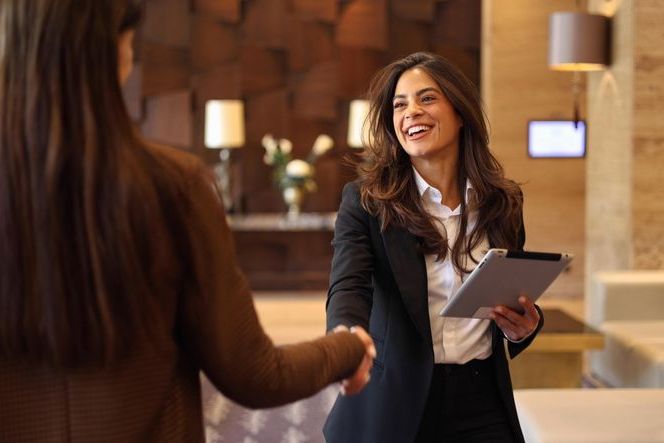
The Handshake: New Evidence Suggests They Make Better Business Deals
August 13, 2018 Written by Josh Hrala

Compare Providers
Download our outplacement comparison sheet
Request Pricing
Compare our rates to other providers
Consider the handshake. The act of grasping another person by the hand and shaking it up and down. What’s the point of this? How does it seal deals?
“If you were an alien coming to earth and looking at what people do, you would think, ‘What is the purpose of this thing?'” said researcher Juliana Schroeder, from the University of California, Berkeley’s Haas School of Business, who recently published a study in the Journal of Personality and Social Psychology looking into the impact of the handshake.
While you’ve probably never given the simple act much thought, because it’s so ingrained into our culture at this point, Schroeder and her team wanted to know if the handshake actually works, as in: does it impact business deals in any way or is it just something we do because we’re trained to?
To find out the impact of the handshake, Schroeder and her team had participants come together and work on projects to score points. The researchers never told the participants to shake hands before starting. However, the teams that did shake hands ended up scoring more points than non-hand shakers.
The strange thing about this that both sides of the handshake – person A and B, for example – both ended up scoring more points, suggesting that the handshake is beneficial to both parties involved in the ‘deal.’
“When you shake hands with someone, you make an immediate inference that ‘They are going to cooperate with me; they are not going to do me harm,'” Schroeder said.
“And so you decide to cooperate with them.”
Now the question becomes: is it the actual handshake that makes the team work better or is it the fact that those who shake hands are different than those that don’t. In other words, is the handshake actually responsible?
“Maybe handshaking people are just nicer, more conscientious people who tend to be more cooperative,” Schroeder said.
To find out more, the team ran the experiment again. This time, they told certain groups to shake hands before proceeding. The result was telling: the groups that were told to shake hands before working together ended up scoring more points than the teams that didn’t.
This suggests that the handshake is actually powerful and may help bind a team together on a psychological level.
It changes the way you perceive not just the other person, but the way you frame the whole game,” Schroeder said.
“You say to yourself, ‘Now we are in a cooperative setting rather than an antagonistic one.'”
The team’s latest findings offer a more scientific look into how handshakes impact business deals. If the research continues, it will be interesting to see how handshakes impact deals that have something to win or lose in the process.
A Brief History of the Handshake
While it’s something that we barely think about in today’s world, the history of the handshake goes back centuries.
“Archaeological ruins show handshaking practices being used as long ago as in ancient Greek times, as early as the 5th Century BC,” reports BBC.
“Historians have found images on items like ancient pots showing people touching hands to make deals, for example.”
And the handshake has an extremely practical reasoning behind it. Back in the day, many people carried weapons on them. Usually, this meant a sword in a scabbard, which hung from the left side of the person’s waist.
By extending the right hand out and shaking the other person’s right hand, both parties signaled that they are coming in peace, unable to grab the sword while the hands are being shook.
“Shaking hands, which is traditionally done with your right hand, became a friendly greeting because it was proof that you came in peace and weren’t holding a weapon,” BBC continues.
“It was also a sign of trust that you believed the other person wasn’t going to take their sword out to fight you either!”
So, in short, we shake hands – or started to shake hands, rather – to show that we weren’t trying to attack the person we were meeting with. It was a mutual sign of respect and trust. After all, if you extend your hand to someone and they chop it off with a sword, you can bet that your deal has fallen through.
In today’s world where we no longer carry around long, sharp pieces of metal, the handshake continues as a sign of respect in many countries.
You can read the team’s full study in the Journal of Personality and Social Psychology.
In need of outplacement assistance?
At Careerminds, we care about people first. That’s why we offer personalized talent management solutions for every level at lower costs, globally.


